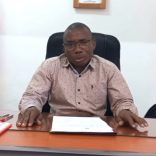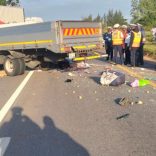Mozambique: One dead and three injured during mine invasion - AIM report
‘Don’t splash kidnappings all over social media’/ Gangs also target Mozambicans living in SA

Former SAPS commissioner Dr Chris de Kock, clinical psychologist and former head of SAPS Gerard Labuschagne, head of SAPS hostage negotiators Dr Colonel Ernst Strydom and anti-crime and social activist Yusuf Abramjee unpack the spate of kidnappings of businessmen. Picture: Thobile Mathonsi/ANA
The worst thing you can do after a family member or a friend is kidnapped is splash it all over social media.
This was the stern warning of Pretoria-based anti-crime and social activist Yusuf Abramjee during a joint briefing convened by the National Press Club to unpack the spate of kidnappings of businessmen in South Africa.
“Do not post it on social media; that’s the worst thing you can do. These people (kidnappers) don’t like publicity. If they feel cornered and in the spotlight, there is no telling what they might do to the victim,” Abramjee said.
Kidnappers were highly sophisticated and active on social media, he said. He experienced this during negotiations on Pretoria businessman Omar Carrim’s kidnapping. The Laudium man was kidnapped and held for 137 days last year.
Abramjee said the family received a call from the kidnappers saying “tell Yusuf to carry on tweeting and you will see”.
Therefore, he advised that the first thing to do after a suspected kidnapping was to report it to the police. The next step was to start recording phone calls with the kidnappers, especially when they ask for ransom.
Many gangs targeted largely Indian, Pakistani, Chinese, Bangladeshi, Zimbabwean and Mozambican nationals living in South Africa.
What was worrying, he said, was that these syndicates were becoming more daring and sophisticated, eyeing multi-million rand targets for hefty ransoms.
Abramjee raised the alarm, warning that South Africa needed to clamp down on the trend before it escalated. “There has been a series of kidnappings in recent years and it appears to be escalating.
“Many of the victims are forced to pay the ransom locally. Other gangs demand payment in foreign countries, making it difficult for law enforcement agencies to follow the trail,” Abramjee said.
Last year alone, Abramjee dealt with 15 cases of kidnapping.
He assisted a family from Polokwane when Anisah Moosa was kidnapped. The gang demanded R3million in cash, but was eventually arrested. He said the suspects were all South Africans.
“There have since been a number of similar kidnappings. A businessman in Mafikeng was kidnapped a few weeks ago and freed by police within 24 hours. Arrests were made.”
In another incident, Abramjee said, a wealthy Cape Town businessman, Naushad Deshmukh Khan, 46, was kidnapped late in 2016. “The kidnappers demanded millions of dollars in cash. A ransom of R9722900 was eventually paid and Khan was freed two months later. No arrests have been made,” Abramjee said.
Andy Mashile, Interpol ambassador for Turn Back Crime, said the kingpins of these syndicates could even be abroad giving orders. “All they are interested in is getting the hard cash.
“Khan’s kidnapping was the first in South Africa having the features of an international organised crime syndicate at work. For obvious reasons, some of the information cannot be shared.”
Clinical psychologist and former head of the SAPS Specialised Investigation Psychology Section, Professor Gerard Labuschagne, said kidnapping for ransom was not common in the country – until recently.
Some were even learning the tricks of the trade and were “copycats”, he said. The amateur kidnappers might even kill the victims because of inexperience and trying to get rid of the evidence,” he said.
Kidnappings were rife in Maputo for years, he said, but police in Mozambique, assisted by international law enforcement agencies, broke the syndiactes’ backbone.












Leave a Reply
Be the First to Comment!
You must be logged in to post a comment.
You must be logged in to post a comment.